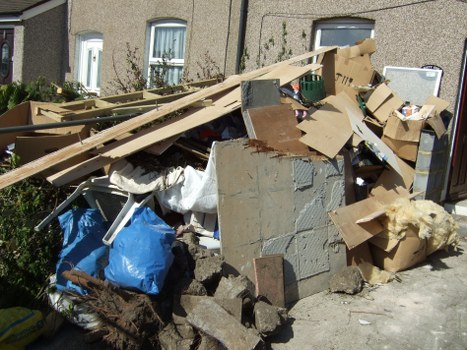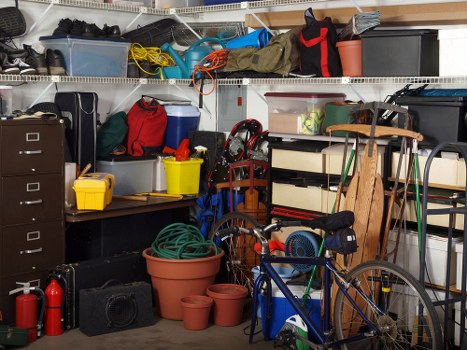Effective Waste Disposal in Clerkenwell: A Comprehensive Guide

Waste disposal is a critical aspect of maintaining a clean and healthy environment in Clerkenwell. Whether you're a resident, business owner, or just passing through, understanding the best practices for waste management can make a significant difference.
Clerkenwell, located in the heart of London, faces unique challenges when it comes to waste disposal. High population density, numerous businesses, and limited space require efficient and effective waste management solutions.
In this guide, we'll explore the various waste disposal options available in Clerkenwell, the regulations you need to be aware of, and tips for managing your waste responsibly.
Understanding Waste Disposal in Clerkenwell

Waste disposal involves the collection, transport, processing, recycling, and disposal of waste materials. In Clerkenwell, this process is managed by both public and private entities to ensure that waste is handled in an environmentally friendly and efficient manner.
Proper waste disposal is not only important for maintaining cleanliness but also for protecting public health and the environment. Improper disposal can lead to pollution, attract pests, and contribute to the spread of diseases.
Clerkenwell has implemented several waste disposal initiatives to address these challenges, including recycling programs, waste segregation, and the use of advanced waste processing technologies.
Types of Waste

Household Waste
Household waste includes everyday items like food scraps, paper, plastics, and glass. Proper segregation of these materials is essential for effective recycling and disposal.
Commercial Waste
Businesses in Clerkenwell generate commercial waste, which can include packaging materials, office waste, and specialized industrial waste. Managing this type of waste often requires tailored solutions.
Hazardous Waste
Hazardous waste includes materials that are dangerous to human health or the environment, such as chemicals, batteries, and electronic waste. Special handling and disposal methods are necessary for hazardous waste.
Waste Disposal Services in Clerkenwell

Clerkenwell offers a range of waste disposal services to cater to different needs. These services ensure that waste is managed efficiently and sustainably.
Recycling Programs
- Paper and Cardboard Recycling
- Plastic and Glass Recycling
- Electronic Waste Recycling
Collection Services
- Regular Household Collection
- Commercial Waste Collection
- Special Collection for Bulky Items
Disposal Facilities
- Landfills
- Incineration Plants
- Recycling Centers

Regulations and Guidelines
Understanding the regulations surrounding waste disposal in Clerkenwell is crucial for compliance and environmental protection. The local council enforces several guidelines to ensure proper waste management.
Segregation Rules
Residents and businesses are required to segregate their waste into designated categories. This helps in efficient recycling and reduces the amount of waste sent to landfills.
Disposal Limits
There are limits on the amount of certain types of waste that can be disposed of in regular waste collection. Exceeding these limits may incur additional fees or require special arrangements.
Prohibited Items
Certain items are prohibited from regular waste disposal services due to their hazardous nature. These include chemicals, batteries, and electronic devices. Proper channels must be used for disposing of these items.
Tips for Effective Waste Management
Managing your waste effectively can contribute to a cleaner Clerkenwell and a healthier environment. Here are some practical tips:
- **Reduce**: Minimize the amount of waste you produce by choosing reusable products and avoiding single-use items.
- **Reuse**: Find new uses for old items instead of discarding them.
- **Recycle**: Make sure to separate recyclable materials and follow the local recycling guidelines.
- **Compost**: Composting organic waste can reduce the amount of trash sent to landfills and provide nutrient-rich soil for gardening.
- **Dispose Properly**: Follow the regulations for disposing of hazardous and bulky waste to ensure it is handled safely.
Community Involvement
Participating in community clean-up events and educational programs can enhance waste management efforts in Clerkenwell. Engaging with neighbors and local organizations fosters a collective responsibility for maintaining a clean environment.
10-15 Closest Areas to Clerkenwell for Waste Disposal
Clerkenwell is strategically located near several key areas that also benefit from efficient waste disposal services. Understanding the proximity and features of these areas can help residents and businesses manage their waste more effectively.
- Farringdon: Just north of Clerkenwell, Farringdon offers advanced recycling facilities and regular waste collection services.
- Islington: East of Clerkenwell, Islington has specialized programs for hazardous waste disposal.
- Bloomsbury: South of Clerkenwell, Bloomsbury provides comprehensive recycling initiatives and community composting sites.
- Hoxton: Located southwest, Hoxton has efficient commercial waste collection services tailored for businesses.
- Holborn: West of Clerkenwell, Holborn features state-of-the-art waste processing plants.
- Barbican: Directly adjacent, Barbican benefits from shared waste disposal resources and facilities.
- Shoreditch: Northeast of Clerkenwell, Shoreditch offers innovative waste reduction programs for residents and businesses.
- Camden Town: A short distance away, Camden Town supports extensive recycling and waste management services.
- King's Cross: Southeast, King's Cross integrates waste disposal with its major redevelopment projects.
- Marylebone: Northwest, Marylebone provides efficient waste collection and disposal services for both residential and commercial areas.
- Soho: A vibrant area nearby, Soho emphasizes sustainable waste management practices.
- Covent Garden: East, Covent Garden benefits from its proximity to multiple waste disposal centers.
- Mayfair: Southwest, Mayfair offers premium waste disposal services for upscale residences and businesses.
- Paddington: Southwest, Paddington has robust waste management systems supporting its transport hubs.
Technology and Innovation in Waste Disposal
Advancements in technology are playing a significant role in improving waste disposal in Clerkenwell. Smart waste management systems, automated collection vehicles, and advanced recycling technologies are some of the innovations making waste disposal more efficient.
Smart Bins
Smart bins equipped with sensors can monitor waste levels in real-time, optimizing collection routes and reducing unnecessary trips.
Automated Collection
Automated waste collection vehicles can reduce labor costs and increase the frequency of waste collection, ensuring that waste is picked up promptly and efficiently.
Recycling Technologies
Advanced recycling technologies allow for better separation and processing of recyclable materials, increasing the rate of recycling and reducing the amount of waste sent to landfills.
Environmental Impact of Waste Disposal
Proper waste disposal in Clerkenwell helps mitigate the environmental impact of waste. Effective waste management reduces pollution, conserves natural resources, and supports sustainability.
Pollution Reduction
By recycling and properly disposing of waste, we can significantly reduce air, water, and soil pollution in Clerkenwell and surrounding areas.
Resource Conservation
Recycling materials like paper, plastic, and metal conserves valuable resources and reduces the need for raw material extraction.
Sustainable Practices
Adopting sustainable waste management practices ensures that Clerkenwell remains a pleasant and healthy place to live and work for future generations.
Challenges in Waste Disposal
Despite the efforts made, waste disposal in Clerkenwell faces several challenges. Addressing these issues is essential for improving waste management systems.
Limited Space
Clerkenwell's urban environment means there is limited space for waste disposal facilities, making efficient use of available space crucial.
High Population Density
The high number of residents and businesses increases the volume of waste generated, putting pressure on waste management services.
Contamination of Recyclables
Contaminated recyclable materials can hinder the recycling process, leading to higher costs and lower recycling rates.
Public Awareness
Raising public awareness about proper waste disposal practices is necessary to ensure community participation and compliance with waste management regulations.
Future of Waste Disposal in Clerkenwell
The future of waste disposal in Clerkenwell looks promising with ongoing initiatives and technological advancements. The focus is on creating a more sustainable and efficient waste management system.
Sustainable Initiatives
Community-driven initiatives aimed at reducing waste, increasing recycling rates, and promoting sustainable practices will continue to grow in Clerkenwell.
Technological Integration
Integrating new technologies like artificial intelligence and machine learning can further optimize waste collection and processing, making the system more efficient and responsive.
Policy Enhancements
Enhanced policies and stricter regulations will help ensure that waste disposal practices meet environmental standards and support long-term sustainability goals.
Conclusion
Waste disposal in Clerkenwell is a critical component of maintaining a clean and healthy environment. By understanding the types of waste, utilizing available disposal services, following regulations, and adopting effective waste management practices, residents and businesses can contribute to a more sustainable future.
Embracing new technologies and participating in community initiatives will further enhance waste management efforts, ensuring that Clerkenwell remains a vibrant and thriving area for all.
Frequently Asked Questions
1. How do I dispose of hazardous waste in Clerkenwell?
Hazardous waste should not be disposed of in regular waste bins. You can take it to designated hazardous waste collection points or arrange for a special pickup through local waste disposal services.
2. What items are recyclable in Clerkenwell?
Common recyclable items include paper, cardboard, plastics, glass bottles and jars, and certain types of metal. It's important to clean and sort these items according to local recycling guidelines.
3. How often is waste collected in Clerkenwell?
Waste collection frequency in Clerkenwell varies depending on the area and type of waste. Typically, household waste is collected weekly, while commercial waste may have more frequent pickups.
4. Are there any penalties for improper waste disposal?
Yes, improper waste disposal can result in fines or other penalties. It's important to follow local regulations to avoid any legal issues and to help protect the environment.
5. How can I reduce my waste footprint in Clerkenwell?
You can reduce your waste footprint by minimizing single-use items, embracing reusable products, recycling diligently, composting organic waste, and supporting local waste reduction initiatives.